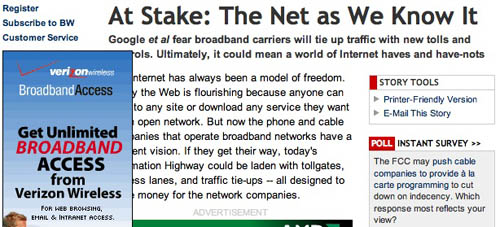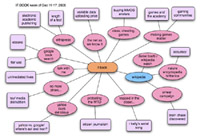
This Spartan Life, our favorite talk show in Halo space, just posted a hilarious video blog entry making the case for network neutrality. In some ways, this is the perfect medium for illustrating a threat to virtual spaces, conveying more in a couple of minutes than several weeks worth of op-eds. Enjoy it now before the party’s over.
(In case you missed it, here’s TSL’s interview with Bob.)
Category Archives: network_neutrality
privacy matters
In a recent post, Susan Crawford magisterially weaves together a number of seemingly disparate strands into a disturbing picture of the future of privacy, first looking at the still under-appreciated vulnerability of social networking sites. Recently ratcheted-up scrutiny on MySpace and other similar episodes suggest to Crawford that some sort of privacy backlash is imminent — a backlash, however, that may come too late.
The “too late” part concerns the all too likely event of a revised Telecommunications bill that will give internet service providers unprecedented control over what data flows through their pipes, and at what speed:
…all of the privacy-related energy directed at the application layer (at social networks and portals and search engines) may be missing the point. The real story in this country about privacy will be at a lower layer – at the transport layer of the internet. The pipes. The people who run the pipes, and particularly the last mile of those pipes, are anxious to know as much as possible about their users. And many other incumbents want this information too, like law enforcement and content owners. They’re all interested in being able to look at packets as they go by their routers, something that doesn’t traditionally happen on the traditional internet.
…and looking at them makes it possible for much more information to be available. Cisco, in particular, has a strategy it calls the “self-defending network,” which boils down to tracking much more information about who’s doing what. All of this plays on our desires for security – everyone wants a much more secure network, right?
Imagine an internet without spam. Sounds great, but at what price? Manhattan is a lot safer these days (for white people at least) but we know how Giuliani pulled that one off. By talking softly and carrying a big broom; the Disneyfication of Times Square etc. In some ways, Times Square is the perfect analogy for what America’s net could become if deregulated.

And we don’t need to wait for Congress for the deregulation to begin. Verizon was recently granted exemption from rules governing business broadband service (price controls and mandated network-sharing with competitors) when a deadline passed for the FCC to vote on a 2004 petition from Verizon to entirely deregulate its operations. It’s hard to imagine how such a petition must have read:
“Dear FCC, please deregulate everything. Thanks. –Verizon”
And harder still to imagine that such a request could be even partially granted simply because the FCC was slow to come to a decision. These people must be laughing very hard in a room very high up in a building somewhere. Probably Times Square.
Last month, when a federal judge ordered Google to surrender a sizable chunk of (anonymous) search data to the Department of Justice, the public outcry was predictable. People don’t like it when the government starts snooping, treading on their civil liberties, hence the ongoing kerfuffle over wiretapping. What fewer question is whether Google should have all this information in the first place. Crawford picks up on this:
…three things are working together here, a toxic combination of a view of the presidency as being beyond the law, a view by citizens that the internet is somehow “safe,” and collaborating intermediaries who possess enormous amounts of data.
The recent Google subpoena case fits here as well. Again, the government was seeking a lot of data to help it prove a case, and trying to argue that Google was essential to its argument. Google justly was applauded for resisting the subpoena, but the case is something of a double-edged sword. It made people realize just how much Google has on hand. It isn’t really a privacy case, because all that was sought were search terms and URLS stored by Google — no personally-identifiable information. But still this case sounds an alarm bell in the night.
New tools may be in the works that help us better manage our online identities, and we should demand that networking sites, banks, retailers and all the others that handle our vital stats be more up front about their procedures and give us ample opportunity to opt out of certain parts of the data-mining scheme. But the question of pipes seems to trump much of this. How to keep track of the layers…
Another layer coming soon to an internet near you: network data storage. Online services that do the job of our hard drives, storing and backing up thousands of gigabytes of material that we can then access from anywhere. When this becomes cheap and widespread, it might be more than our identities that’s getting snooped.
Amazon’s new S3 service charges 15 cents per gigabyte per month, and 20 cents per data transfer. To the frequently asked question “how secure is my data?” they reply:
Amazon S3 uses proven cryptographic methods to authenticate users. It is your choice to keep your data private, or to make it publicly accessible by third parties. If you would like extra security, there is no restriction on encrypting your data before storing it in S3.
Yes, it’s our choice. But what if those third parties come armed with a court order?
net-based video creates bandwidth crunch
Apparently the recent explosion of internet video services like YouTube and Google Video has led to a serious bandwidth bottleneck on the network, potentially giving ammunition to broadband providers in their campaign for tiered internet service.
If Congress chooses to ignore the cable and phone lobbies and includes a network neutrality provision in the new Telecommunications bill, that will then place the burden on the providers to embrace peer-to-peer technologies that could solve the traffic problem. Bit torrent, for instance, distributes large downloads across multiple users in a local network, minimizing the strain on the parent server and greatly speeding up the transfer of big media files. But if govenment capitulates, then the ISPs will have every incentive to preserve their archaic one-to-many distribution model, slicing up the bandwidth and selling it to the highest bidder — like the broadcast companies of old.
The video bandwidth crunch and the potential p2p solution nicely illustrates how the internet is a self-correcting organic entity. But the broadband providers want to seize on this moment of inneficiency — the inevitable rise of pressure in the pipes that comes from innovation — and exploit it. They ought to remember that the reason people are willing to pay for broadband service in the first place is because they want access to all the great, innovative stuff developing on the net. Give them more control and they’ll stifle that innovation, even as they say they’re providing better service.
lessig: read/write internet under threat
In an important speech to the Open Source Business Conference in San Francisco, Lawrence Lessig warned that decreased regulation of network infrastructure could fundamentally throw off the balance of the “read/write” internet, gearing the medium toward commercial consumption and away from creative production by everyday people. Interestingly, he cites Apple’s iTunes music store, generally praised as the shining example of enlightened digital media commerce, as an example of what a “read-only” internet might look like: a site where you load up your plate and then go off to eat alone.
Lessig is drawing an important connection between the question of regulation and the question of copyright. Initially, copyright was conceived as a way to stimulate creative expression — for the immediate benefit of the author, but for the overall benefit of society. But over the past few decades, copyright has been twisted by powerful interests to mean the protection of media industry business models, which are now treated like a sacred, inviolable trust. Lessig argues that it’s time for a values check — time to return to the original spirit of copyright:
It’s never been the policy of the U.S. government to choose business models, but to protect the authors and artists… I’m sure there is a way for [new models to emerge] that will let artists succeed. I’m not sure we should care if the record companies survive. They care, but I don’t think the government should.
Big media have always lobbied for more control over how people use culture, but until now, it’s largely been through changes to the copyright statutes. The distribution apparatus — record stores, booksellers, movie theaters etc. — was not a concern since it was secure and pretty much by definition “read-only.” But when we’re dealing with digital media, the distribution apparatus becomes a central concern, and that’s because the apparatus is the internet, which at present, no single entity controls.
Which is where the issue of regulation comes in. The cable and phone companies believe that since it’s through their physical infrastructure that the culture flows, that they should be able to control how it flows. They want the right to shape the flow of culture to best fit their ideal architecture of revenue. You can see, then, how if they had it their way, the internet would come to look much more like an on-demand broadcast service than the vibrant two-way medium we have today: simply because it’s easier to make money from read-only than from read/write — from broadcast than from public access.”
Control over culture goes hand in hand with control over bandwidth — one monopoly supporting the other. And unless more moderates like Lessig start lobbying for the public interest, I’m afraid our government will be seduced by this fanatical philosophy of control, which when aired among business-minded people, does have a certain logic: “It’s our content! Our pipes! Why should we be bled dry?” It’s time to remind the media industries that their business models are not synonymous with culture. To remind the phone and cable companies that they are nothing more than utility companies and that they should behave accordingly. And to remind the government who copyright and regulation are really meant to serve: the actual creators — and the public.
more grist for the “pipes” debate
A couple of interesting items:
Larry Lessig wrote an excellent post last week debunking certain myths circulating the “to regulate or not to regulate” debate in Washington, namely that introducing “net neutrality” provisions in the new Telecom bill would impose unprecedented “common carriage” regulation on network infrastructure. Of course, the infrastructure was regulated before — when the net was accessed primarily through phone lines. Lessig asks: if an unregulated market is so good for the consumer, then why is broadband service in this country so slow and so expensive?
Also worth noting is a rough sketch from internet entrepreneur Mark Cuban of the idea of “tiered” network service. This would entail prioritizing certain uses of bandwidth. For example, your grandma’s web-delivered medical diagnostics would be prioritized over the teenager downloading music videos next door (if, that is, someone shells out for the priority service). This envisions for the consumer end what cable and telephone execs have dreamed of on the client end — i.e. charging certain web services more for faster page loads and speedier content delivery. Seems to me that either scenario would make the U.S. internet more like the U.S. healthcare system: abysmal except for those with cash.
last week: wikipedia, r kelly, gaming and google panels, and more…
Here’s an overview of what we’ve been posting over the last week. As well, a few of us having been talking about ways to graphically represent text, so I thought I would include a mind map of this overview.
As a follow up to the increasingly controversial wikipedia front, Daniel Brandt uncovered that Brian Chase posted false information about John Seignthaler that was reported here last week. To add fuel to the fire, Nature weighed in that Encyclopedia Britannica may not be as reliable as Wikipedia.
Business Week noted a possible future of pricing for data transfer. Currently, carries such as phone and cable companies are developing technology to identify and control what types of media (voice, images, text or video) are being uploaded. This ability opens the door to being able to charge for different uses of data transfer, which would have a huge impact on uploading content for personal creative use of the internet.
Liz Barry and Bill Wetzel shared some of their experiences from their “Talk to Me” Project. With their “talk to me” sign in tow, they travel around New York and the rest of the US looking for conversation. We were impressed at how they do not have a specific agenda besides talking to people. In the mediated age, they are not motivated by external political/ religious/ documentary intentions. What they do document is available on their website, and we look forward to see what they come up with next.
The Google Book Search debate continues as well, via a panel discussion hosted by the American Bar Association. Interestingly, publishers spoke as if the wide scale use of ebooks is imminent. More importantly and even if this particular case settles out of court, the courts have a pressing need to define copyright and fair use guidelines for these emerging uses.
With the protest of the WTO meetings in Hong Kong this past week, new journalism forms took one step forward. The website Curbside @ WTO covered the meetings with submissions from journalism students, bloggers and professional journalists.
McDonalds filed a patent which suggests that it intends to offer clips of movies instead of the traditional toys in their kids oriented Happy Meals. Lisa pondered if a video clip can successfully replace a toy, and if it does, what the effects on children’s imaginations might be.
R. Kelly’s experiments in form and the “serial song” through his Trapped in the Closet recordings. While R Kelly has varying success in this endeavor, Dan compared the experience of not only the serial novel, but also Julie Powell’s foray into transferring her blog into book form and what she might have learned from R. Kelly (its hard to make unified pieces maintain an overall coherency.)
The world of academic publishing was challenged with a proposal calling to create an electronic academic press. This segment seems especially ripe for the shift to digital publishing as many journals with small circulations face raising printing and production costs.
Sol and others from the institute attended “Making Games Matter,” a panel with contributors from The Game Design Reader: A Rules of Play Anthology, edited by Katie Salen and Eric Zimmerman. The discussion covered among other things: involving the academy in creating a discourse for gaming and game design, obstacles in studying and creating games, and the game “industry” itself. The book and panel called out for games and gaming to undergo a formal study akin to the novel and the experience of reading. Also, in the gaming world, the class economics of the real and virtual began to emerge as a Chinese firm pays employees to build up characters in MMOGs to sell to affluent gamers.
the net as we know it
There’s a good article in Business Week describing the threat posed by unregulated phone and cable companies to the freedom and neutrality of the internet. The net we know now favors top-down and bottom-up publishing equally. Yahoo! or The New York Times may have more technical resources at their disposal than your average blogger, but in the pipes that run in and out of your home connecting you to the net, they are equals.
That could change, however. Unless government gets pro-active on the behalf of ordinary users, broadband providers will be free to privilege certain kinds of use and certain kinds of users, creating the conditions for a broadcast-oriented web and charging higher premiums for more independently creative uses of bandwidth.
Here’s how it might work:
So the network operators figure they can charge at the source of the traffic — and they’re turning to technology for help. Sandvine and other companies, including Cisco Systems, are making tools that can identify whether users are sending video, e-mail, or phone calls. This gear could give network operators the ability to speed up or slow down certain uses.
That capability could be used to help Internet surfers. BellSouth, for one, wants to guarantee that an Internet-TV viewer doesn’t experience annoying millisecond delays during the Super Bowl because his teenage daughter is downloading music files in another room.
But express lanes for certain bits could give network providers a chance to shunt other services into the slow lane, unless they pay up. A phone company could tell Google or another independent Web service that it must pay extra to ensure speedy, reliable service.
One commenter suggests a rather unsavory scheme:
The best solution is to have ISPs change monthly billing to mirror cell phone bills: X amount of monthly bandwidth any overage customer would be charged accordingly. File sharing could become legit, as monies from our monthly bills could be funneled to the apprioprate copyright holder (big media to regular Joe making music in his room) and the network operators will be making more dough on their investment. With the Skypes of the world I can’t see this not happenning!

It seems appropriate that when I initially tried to read this article, a glitchy web ad was blocking part of the text — an ad for broadband access no less. Bastards.
insidious tactic #348: charge for web speed
An article in yesterday’s Washington Post — “Executive Wants to Charge for Web Speed” — brings us back to the question of pipes and the future of the internet.  The chief technology officer for Bell South says telecoms and cable companies ought to be allowed to offer priority deals to individual sites, charging them extra for faster connections. The Post:
The chief technology officer for Bell South says telecoms and cable companies ought to be allowed to offer priority deals to individual sites, charging them extra for faster connections. The Post:
Several big technology firms and public interest groups say that approach would enshrine Internet access providers as online toll booths, favoring certain content and shutting out small companies trying to compete with their offerings.
Among these “big technology firms” are Google, Yahoo!, Amazon and eBay, all of whom have pressed the FCC for strong “network neutrality” provisions in the latest round of updates to the 1996 Telecommunications Act. These would forbid discrimination by internet providers against certain kinds of content and services (i.e. the little guys). BellSouth claims to support the provisions, though the statements of its tech officer suggest otherwise.
Turning speed into a bargaining chip will undoubtedly privilege the richer, more powerful companies and stifle competition — hardly a net-neutral scenario. They claim it’s no different from an airline offering business class — it doesn’t prevent folks from riding coach and reaching their destination. But we all know how cramped and awful coach is. The truth is that the service providers discriminate against everyone on the web. We’re all just freeloaders leeching off their pipes. The only thing that separates Google from the lady blogging about her cat is how much money they can potentially pay for pipe rental. That’s where the “priorities” come in.
Moreover, the web is on its way to merging with cable television, and this, in turn, will increase the demand for faster connections that can handle heavy traffic. So “priority” status with the broadband providers will come at an ever increasing premium. That’s their ideal business model, allowing them to charge the highest tolls for the use of their infrastructure. That’s why the telecos and cablecos want to ensure, through speed-baiting and other screw-tightening tactics, that the net transforms from a messy democratic commons into a streamlined broadcast medium. Alternative media, video blogging, local video artists? These will not be “priorities” in the new internet. Maximum profit for pipe-holders will mean minimum diversity and a one-way web for us.
In a Business Week interview last month, SBC Telecommunications CEO Edward Whitacre expressed what seemed almost like a lust for revenge. Asked, “How concerned are you about Internet upstarts like Google, MSN, Vonage, and others?” he replied:
How do you think they’re going to get to customers? Through a broadband pipe. Cable companies have them. We have them. Now what they would like to do is use my pipes free, but I ain’t going to let them do that because we have spent this capital and we have to have a return on it. So there’s going to have to be some mechanism for these people who use these pipes to pay for the portion they’re using. Why should they be allowed to use my pipes?
The Internet can’t be free in that sense, because we and the cable companies have made an investment and for a Google or Yahoo! or Vonage or anybody to expect to use these pipes [for] free is nuts!
This makes me worry that discussions about “network neutrality” overlook a more fundamental problem: lack of competition. “That’s the voice of someone who doesn’t think he has any competitors,” says Susan Crawford, a cyberlaw and intellectual property professor at Cardozo Law School who blogs eloquently on these issues. She believes the strategy to promote network neutrality will ultimately fail because it accepts a status quo in which a handful of broadband monopolies dominate the market. “We need to find higher ground,” she says.
I think the real fight should be over rights of way and platform competition. There’s a clear lack of competition in the last mile — that’s where choice has to exist, and it doesn’t now. Even the FCC’s own figures reveal that cable modem and DSL providers are responsible for 98% of broadband access in the U.S., and two doesn’t make a pool. If the FCC is getting in the way of cross-platform competition, we need to fix that. In a sense, we need to look down — at the relationship between the provider and the customer — rather than up at the relationship between the provider and the bits it agrees to carry or block…
…Competition in the market for pipes has to be the issue to focus on, not the neutrality of those pipes once they have been installed. We’ll always lose when our argument sounds like asking a regulator to shape the business model of particular companies.
The broadband monopolies have their priorities figured out. Do we?
image: “explosion” (reminded me of fiber optic cable) by The Baboon, via Flickr

